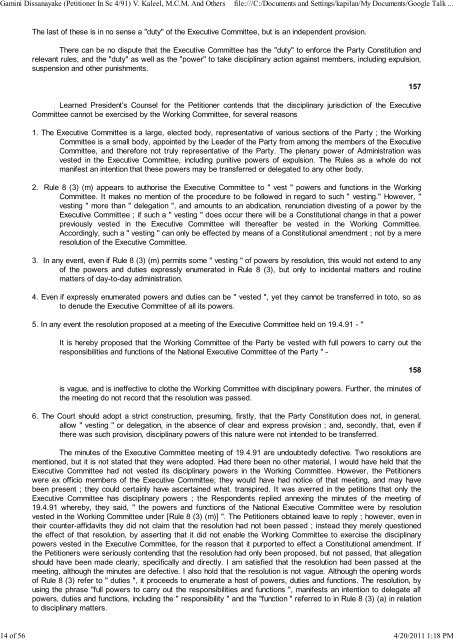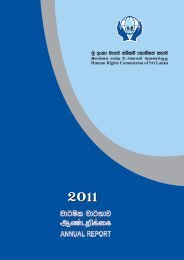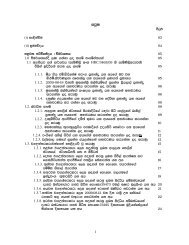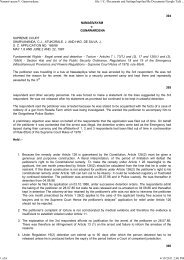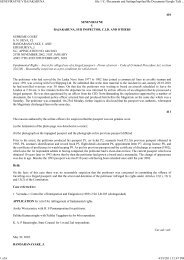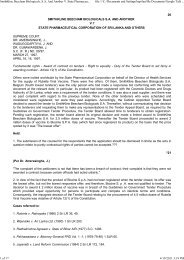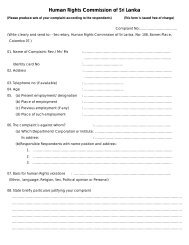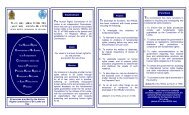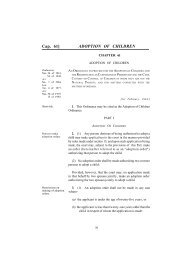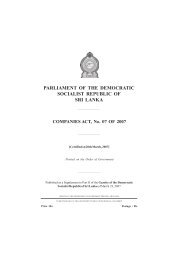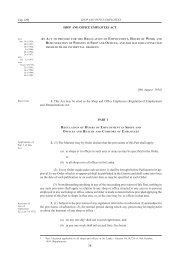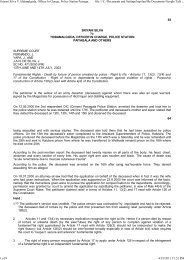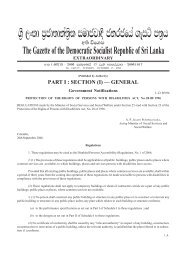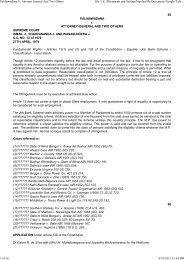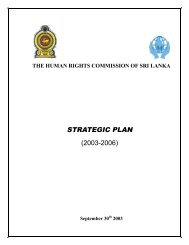Gamini Dissanayake (Petitio... - Human Rights Commission of Sri ...
Gamini Dissanayake (Petitio... - Human Rights Commission of Sri ...
Gamini Dissanayake (Petitio... - Human Rights Commission of Sri ...
You also want an ePaper? Increase the reach of your titles
YUMPU automatically turns print PDFs into web optimized ePapers that Google loves.
<strong>Gamini</strong> <strong>Dissanayake</strong> (<strong>Petitio</strong>ner In Sc 4/91) V. Kaleel, M.C.M. And Others file:///C:/Documents and Settings/kapilan/My Documents/Google Talk ...<br />
The last <strong>of</strong> these is in no sense a "duty" <strong>of</strong> the Executive Committee, but is an independent provision.<br />
There can be no dispute that the Executive Committee has the "duty" to enforce the Party Constitution and<br />
relevant rules, and the "duty" as well as the "power" to take disciplinary action against members, including expulsion,<br />
suspension and other punishments.<br />
Learned President's Counsel for the <strong>Petitio</strong>ner contends that the disciplinary jurisdiction <strong>of</strong> the Executive<br />
Committee cannot be exercised by the Working Committee, for several reasons<br />
1. The Executive Committee is a large, elected body, representative <strong>of</strong> various sections <strong>of</strong> the Party ; the Working<br />
Committee is a small body, appointed by the Leader <strong>of</strong> the Party from among the members <strong>of</strong> the Executive<br />
Committee, and therefore not truly representative <strong>of</strong> the Party. The plenary power <strong>of</strong> Administration was<br />
vested in the Executive Committee, including punitive powers <strong>of</strong> expulsion. The Rules as a whole do not<br />
manifest an intention that these powers may be transferred or delegated to any other body.<br />
2. Rule 8 (3) (m) appears to authorise the Executive Committee to " vest " powers and functions in the Working<br />
Committee. It makes no mention <strong>of</strong> the procedure to be followed in regard to such " vesting." However, "<br />
vesting " more than " delegation ", and amounts to an abdication, renunciation divesting <strong>of</strong> a power by the<br />
Executive Committee ; if such a " vesting " does occur there will be a Constitutional change in that a power<br />
previously vested in the Executive Committee will thereafter be vested in the Working Committee.<br />
Accordingly, such a " vesting " can only be effected by means <strong>of</strong> a Constitutional amendment ; not by a mere<br />
resolution <strong>of</strong> the Executive Committee.<br />
3. In any event, even if Rule 8 (3) (m) permits some " vesting " <strong>of</strong> powers by resolution, this would not extend to any<br />
<strong>of</strong> the powers and duties expressly enumerated in Rule 8 (3), but only to incidental matters and routine<br />
matters <strong>of</strong> day-to-day administration.<br />
4. Even if expressly enumerated powers and duties can be " vested ", yet they cannot be transferred in toto, so as<br />
to denude the Executive Committee <strong>of</strong> all its powers.<br />
5. In any event the resolution proposed at a meeting <strong>of</strong> the Executive Committee held on 19.4.91 - "<br />
It is hereby proposed that the Working Committee <strong>of</strong> the Party be vested with full powers to carry out the<br />
responsibilities and functions <strong>of</strong> the National Executive Committee <strong>of</strong> the Party " -<br />
is vague, and is ineffective to clothe the Working Committee with disciplinary powers. Further, the minutes <strong>of</strong><br />
the meeting do not record that the resolution was passed.<br />
6. The Court should adopt a strict construction, presuming, firstly, that the Party Constitution does not, in general,<br />
allow " vesting " or delegation, in the absence <strong>of</strong> clear and express provision ; and, secondly, that, even if<br />
there was such provision, disciplinary powers <strong>of</strong> this nature were not intended to be transferred.<br />
The minutes <strong>of</strong> the Executive Committee meeting <strong>of</strong> 19.4.91 are undoubtedly defective. Two resolutions are<br />
mentioned, but it is not stated that they were adopted. Had there been no other material, I would have held that the<br />
Executive Committee had not vested its disciplinary powers in the Working Committee. However, the <strong>Petitio</strong>ners<br />
were ex <strong>of</strong>ficio members <strong>of</strong> the Executive Committee; they would have had notice <strong>of</strong> that meeting, and may have<br />
been present ; they could certainly have ascertained what. transpired. It was averred in the petitions that only the<br />
Executive Committee has disciplinary powers ; the Respondents replied annexing the minutes <strong>of</strong> the meeting <strong>of</strong><br />
19.4.91 whereby, they said, " the powers and functions <strong>of</strong> the National Executive Committee were by resolution<br />
vested in the Working Committee under [Rule 8 (3) (m)] ". The <strong>Petitio</strong>ners obtained leave to reply ; however, even in<br />
their counter-affidavits they did not claim that the resolution had not been passed ; instead they merely questioned<br />
the effect <strong>of</strong> that resolution, by asserting that it did not enable the Working Committee to exercise the disciplinary<br />
powers vested in the Executive Committee, for the reason that it purported to effect a Constitutional amendment. If<br />
the <strong>Petitio</strong>ners were seriously contending that the resolution had only been proposed, but not passed, that allegation<br />
should have been made clearly, specifically and directly. I am satisfied that the resolution had been passed at the<br />
meeting, although the minutes are defective. I also hold that the resolution is not vague. Although the opening words<br />
<strong>of</strong> Rule 8 (3) refer to " duties ", it proceeds to enumerate a host <strong>of</strong> powers, duties and functions. The resolution, by<br />
using the phrase "full powers to carry out the responsibilities and functions ", manifests an intention to delegate al!<br />
powers, duties and functions, including the " responsibility " and the "function " referred to in Rule 8 (3) (a) in relation<br />
to disciplinary matters.<br />
14 <strong>of</strong> 56 4/20/2011 1:18 PM<br />
157<br />
158


